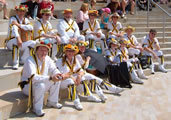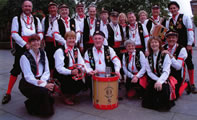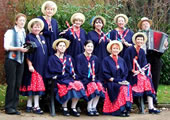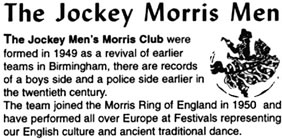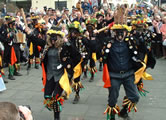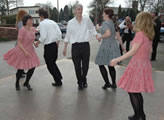Middlewich
Folk & Boat Festival: Friday 16th - Sunday 18th June 2006
![]() Festival
Guide . Box
Office . Camping . Stalls
& Stewards . Boats & Canal
. Find Us . Forum
. Archive . Guest
Book . Contact
Festival
Guide . Box
Office . Camping . Stalls
& Stewards . Boats & Canal
. Find Us . Forum
. Archive . Guest
Book . Contact
|
|
| A
colourful collection of outstanding Morris Teams are performing
at the Festival. They'll be featuring in the Procession on the Saturday
morning and then dancing at locations around the town until about
4pm. The locations are: the main Festival site, the Kings Lock pub
and the Amphitheatre. The Earl of Stamford Morris are based in the village of Moore, near Warrington. They particularly like the audience to shout the name of their village after each dance! They are a mixed side (men and women) and believe in involving the younger generation in their performances. They dance mainly in the Cotswold tradition and wear white, with black and gold ribbons and baldrics. They pride themselves in their dancing and music, and their enjoyment is obvious to all. Do not miss their dance announcements, which tend to throw a new perspective on the long-lost history of the morris. Stockport Morris Men were formed in 1984. The team adopted the name of a group who had danced in the town in the 1890’s. The history of the original team is virtually unknown, only vague newspaper references and a few notes and figures to their Stockport dance having survived the passage of time. Today’s team are a typical assortment of northern folk, friendly, a great sense of humour, and all with a common interest in keeping their local traditions alive. With a varied repertoire of North West dances associated with the Lancashire plain and pennine mill towns, the team have performed at numerous festivals, including, Rochester, Wimborne, Jersey, Wessex, as well as a number of Rushcarts. The Costume is of traditional design with black breeches, white shirt, embroidered black caps and waistcoats, red cummerbunds and knee length red socks, black patterned clogs, side tankards(of course). Fidlers Fancy Womens Morris were formed originally in the 1880s. This Stockport side was founded by a local fish merchant, to provide recreation for schoolgirls and to collect for charities, such as the Royal National Lifeboat Institute. Fidlers Fancy still wears with pride the smiley fish logo of the company (which now supplies fish and chip shops). The Stockport Carnival dance was passed down to the current team by a member of the Fidler family who recalled dancing in her youth. The team have a repertoire of North West morris dances both traditional, from Cheshire and Lancashire, and more recently devised for special occasions. Fidlers enjoy a wide range of events from local charitable performances to folk and morris festivals around the country, the inevitable morris evenings in the pub and have also danced abroad, including Moscow and Seattle. Fidlers are keen to keep North West Morris alive and new dancers and musicians are always welcome. Rivington Morris are a Women's team of North West Morris Dancers. These demure cultured women hail from near Bolton in Lancashire. Their clogs have been heard as far afield as Sidmouth, Germany, France, Holmfirth, Wigan, Accrington and Blackrod Carnival. Hundreds have looked on in awe and marvelled at their stunning stepping, precision, music and reinforced foundation garments. On-lookers have been heard to say 'Rivington have that certain indefinable something that Northern teams have.......' or 'Make room - these Women take no prisoners.' Do not refer to these women as 'ladies', or you may encounter one of their infamous 'Clog Butties'. Clerical
Error are a team of dancers and street entertainers who
formed to resurrect a style of Morris Dancing indigenous to the
Welsh / English border - known as Border Morris. The origins of
Morris Dancing has been lost in the mist of time but is believed
to have been performed in pre-Christian days as a means of Border Morris
has a unique style by virtue of the fact that the loud and energetic
dancing is performed with sticks and the dancers blacken their faces;
it is believed this was done as a Mind the Step was formed in 1990 by a group of dancers wanting to “do something different” and they have been performing their unique style of Appalachian dance at venues all around the country since then! Appalachian dance originates from traditional English, Irish and Scottish clogging and stepping styles as danced by the immigrants who settled in the Appalachian Mountains in North America. The dance form evolved in remote mountain communities and incorporated steps from the dance style of native Indians and former slaves. Mind the Step use traditional Appalachian clogging, stepping and flat footing styles to choreograph all their own dances, drawing inspiration from many sources ranging from the American flag in Liberty to the name of the local pub in Windmills! This energetic
and exciting dance form will take your breath away – dancers
and spectators!! |
 Venues
and times will
be available from the Festival Office on the weekend.
Venues
and times will
be available from the Festival Office on the weekend.